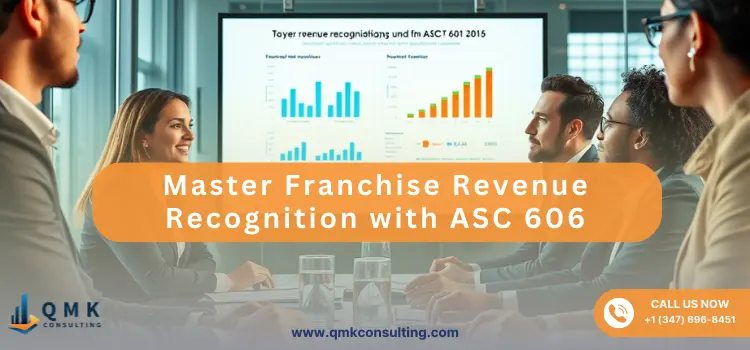
May 12, 2025 |Franchise Solutions


Running a franchise means juggling countless moving parts—brand consistency, operational playbooks, marketing funnels, and, of course, accounting. But when ASC 606 landed on the scene, it upended the way franchisors recognize revenue. Ignore these changes, and you risk misstatements, restatements, fines—or worse, damaged relationships with your investors and lenders.
In this post, we’ll unpack ASC 606 in plain English, walk through your five-step compliance checklist, and show you exactly how to handle initial fees, royalties, pre-opening services, and more. Let’s dive in.
Before ASC 606, franchise accounting was a patchwork of industry practices. Some franchisors booked initial fees upfront, others deferred them entirely, and royalties often followed inconsistent rules. ASC 606 standardized revenue recognition across industries—so no more guesswork.
Misapplying ASC 606 can lead to misstated financials, audit adjustments, and regulatory scrutiny. If you booked a $50,000 initial fee in full the day it hit your bank account—even though you owed 100 hours of training to your franchisee—you’d be out of compliance. That alone could trigger restatements and penalties.
ASC 606, "Revenue from Contracts with Customers," establishes a consistent approach to revenue recognition. It doesn’t care whether you’re in software, manufacturing, or franchising—if you sell goods or services, you follow these rules.
Identify the Contract
A valid contract exists when you and a franchisee agree on rights and payment terms. Make sure your Franchise Disclosure Document (FDD) and signing agreements are crystal-clear.
Pinpoint Performance Obligations
Anything you promise to deliver—site selection support, training, marketing materials, ongoing system support—is a separate obligation if it’s distinct.
Set the Transaction Price
This is the entire amount you anticipate receiving, including contributions to the marketing fund, ongoing royalties, and startup fees. Don’t forget to adjust for variable elements (bonuses, volume discounts).
Allocate That Price
Each performance obligation's total transaction price is divided proportionately by its standalone selling price. For example, if site selection is worth $10,000 standalone and training $5,000, your allocations reflect those ratios.
Recognize Revenue When (or As) It’s Earned
If you provide a training program over 10 weeks, recognize revenue over those 10 weeks—not all at once.
Under ASC 606, booking the entire initial franchise fee on day one is a no-go if you haven’t delivered all promised services. Instead, you defer and recognize as obligations are satisfied.
– Training & Pre-Opening Services: Recognize ratably over the delivery period.
– Pre-Opening Support: Allocate to each milestone—site audits, grand-opening marketing, on-site coaching.
When royalties are a fixed percentage of sales, you recognize them as the franchisee generates revenue. No more estimating—you wait for actual sales reports.
Record royalty revenue when the sales occur, supported by franchisee reporting. Monthly reporting cycles work best for timely, accurate recognition.
If you sell branded equipment or bulk inventory, those are distinct goods: revenue hits when control transfers—usually upon delivery or installation.
Early in 2021, FASB released ASU 2021-02, a useful expedient for private businesses. It lets you treat certain pre-opening services as one bundle instead of splitting countless performance obligations.
To reduce complexity and audit costs for small and midsize franchisors.
If you deliver multiple pre-opening services that are similar and have the same pattern of transfer, you can recognize the entire package over time instead of dissecting every tiny obligation.
From site selection and lease negotiation support to initial training and grand-opening promotion—if each service has stand-alone value, it’s distinct. Under the expedient, you group similar items.
Here are the top trip-ups we see:
Real-world example: A franchisor booked all brand-launch support immediately, only to find they owed months of on-site training. They had to restate earnings—damaging trust and stock price.
For more in-depth considerations, check out this guide on revenue recognition considerations for franchisors.
Don't allow complicated accounting regulations to impede the expansion of your franchise. Our team at QMK Consulting—an accounting firm based in New York City—specializes in helping franchisors navigate ASC 606, streamline revenue recognition, and maintain compliance.
Ready for a stress-free accounting strategy? Book your Free Profit & Cash Flow Analysis with Mohamed Karmous, our restaurant accounting advisor and franchise expert. We’ll give you a clear roadmap to accurate, defensible revenue recognition—and set you up for long-term success.
A: It’s the new, industry-wide standard for recognizing revenue, ensuring consistency and transparency across all contracts.
A: Only as you deliver the promised services—no more booking the full fee on day one.
A: It lets you bundle similar pre-opening services into one performance obligation, reducing complexity.
A: You risk restatements, fines, and loss of stakeholder trust—so get it right from the start.
A: Only if you deliver the ad services immediately; otherwise, defer and recognize over the service period.
Embrace ASC 606 as a tool for clarity—not a hurdle. And remember, QMK Consulting is here to guide you every step of the way. Book your free analysis today and create a successful financial plan for your franchise growth.